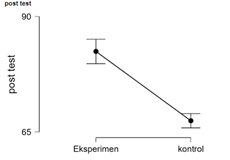The Effectiveness Of Peer Teaching In Achieving Student Understanding In The Subject Of Milling Techniques
DOI:
https://doi.org/10.15294/mbq7ba12Abstract
Education is one of the important human needs that cannot be separated in everyday life. Differences in individual understanding cannot be ignored at every level of human education. Therefore, teachers are required to design learning methods that are able to increase the effectiveness of the individual needs of learnersThe method used in designing this research is quasi experiment. the population in this study amounted to 36 students who were divided into two groups in one class at SMK Negeri 1 Nanggulan. The experimental design used is post test only control group design, which consists of a control class and an experimental class, each of which has a value. The average value on the understanding of the experimental class post-test results shows a value of 82.444 higher than the mean value of the control class. Nmax the experimental class showed 96.50 and Nmin of 72.50. Meanwhile, the Nmax of the control class showed 76.00 and Nmin of 64.00. The Pvalue of homogeneity (Levene's) >0.05 is 0.081 which indicates that the data is normally distributed. Then the normality test Pvalue results are below <0.05 which is 0.040 (experimental), 0.019 (control) by comparing the significance level Pvalue <0.05 then H0 is rejected and H1 is accepted. Peer teaching research proves that it is effective for improving student understanding in the subject of milling techniques of multilevel milling material.
